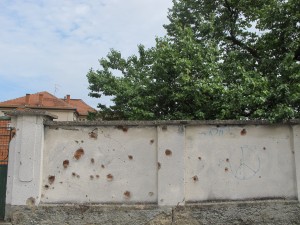We left the common pastures of Croatia and again skirted the border between Croatia and Bosnia, finally crossing for a lunch spot at the border control point. Here an Italian man stopped to wish us well on our journey, only to then return 10 minutes later with a huge watermelon and bottles of fizzy pop; it was a warm welcome back to Bosnia.
After the border crossing, the traces of the war became more and more apparent. Only too aware of the landmines that still contaminate the land, we were careful to find our camping spots either on recently made agricultural land or from specific advice from the locals, leading to some idyllic camps in back gardens and bee orchards, and awakening to the call to prayer.
We were headed for the Brcko District, right on the Croatia-Bosnia border, and close to Serbia; an interesting destination for our theme, it being an ‘independent unit of local self-government’, and supposedly ‘neutral’ from the two main political entities; the Republika Srpska and the Federation of Bosnia and Herzegovina. After the war the population was equally divided between the two parties and became an international experiment to declare the city ‘free’, despite being under the rule of the US and other foreign peacekeeping forces.
On nearing the city, by chance the scouts met a local cycling group, who ended up escorting us the final 10km to a free camping spot  in the city, close to the Sava river and canoe club, who kindly also allowed us to use their facilities.
in the city, close to the Sava river and canoe club, who kindly also allowed us to use their facilities.
Whilst we were there we experienced immense generosity and kindness from local people, who brought us home made pastries, beer, chocolate, slivovica and even a bucket of hand-caught fish… happily eaten by some of the less vegan bikers (discreetly of course).
For me Brčko was one of the most interesting places to pass through. Despite not visiting a ‘project’ there, we spent a lot of time talking and meeting with local people, either at the market, or those who visited us each night to share songs and regional hand made delights.








